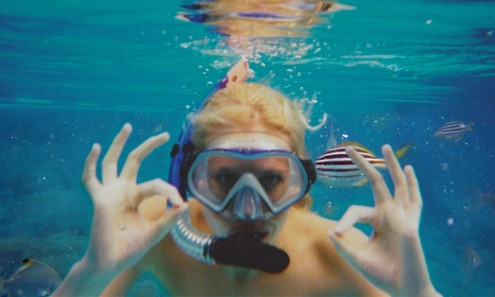
In 2013 graphic designer Zilla van den Born graduated from HKU University of the Arts Utrecht with a project in which she fooled family and friends into believing she was on a 42-day-long journey through Thailand, Cambodia and Laos.
Fakebooking is so old hat that even British comedian Miranda Hart dedicated an episode, aptly called Holiday, to a fake vacation in Thailand.
But Van den Born went beyond the selfie with the giant poster of a palm tree-lined beach in the background. Writes Kickass Trips:
She followed an elaborate scheme of activities, all of it staged. The picture of her snorkelling in Thailand was taken in a swimming pool in Amsterdam and later photoshopped to make it look more tropical. She took photos in tropical aquariums at the Artis Zoo, went to a butterfly garden, bought exotic Asian souvenirs on the market and cooked Thai meals, in her own kitchen of course.
The book Van den Born created for her project is combined with a Layar app to recover the reality behind the manipulation. With her project Van den Born wanted to highlight the difference between our rational attitude to modern day photography (we know everything we see may have been manipulated) to our actual attitude: we still see photos as “the proof of an experience”.
Check her portfolio to see videos of her manipulations and the reactions of her friends and family to finding out it was all fake.
(Photo: Zilla van den Born)

 OK, so this is completely unscientific, but I decided to have a little fun.
OK, so this is completely unscientific, but I decided to have a little fun. Sometimes it is best to shut up. When news show Nieuwsuur reported that Pinkribbon.nl spent only 1.8 % of the donations it received on cancer, the charity threw a hissy fit. The findings of the show were far from the truth, they claimed, and the makers of the programme obviously prejudiced.
Sometimes it is best to shut up. When news show Nieuwsuur reported that Pinkribbon.nl spent only 1.8 % of the donations it received on cancer, the charity threw a hissy fit. The findings of the show were far from the truth, they claimed, and the makers of the programme obviously prejudiced. Business news site
Business news site  A report by the Dutch Association of Journalists (NVJ) claims the Dutch government is the slowest in the world in processing freedom of information requests. FOI consultant Rob Vleugels pointed out to
A report by the Dutch Association of Journalists (NVJ) claims the Dutch government is the slowest in the world in processing freedom of information requests. FOI consultant Rob Vleugels pointed out to  The Court of Appeal in Den Bosch has recently ruled that the public prosecutor must start a case against broadcaster BNN
The Court of Appeal in Den Bosch has recently ruled that the public prosecutor must start a case against broadcaster BNN  Ouwehands Dierenpark, a zoo in Rhenen near Wageningen, has successfully managed to lure reporters to its new orangutan enclosure with a story about behavioural conditioning.
Ouwehands Dierenpark, a zoo in Rhenen near Wageningen, has successfully managed to lure reporters to its new orangutan enclosure with a story about behavioural conditioning.  Municipalities are not allowed to charge for complying with freedom of information requests, a court in The Hague found
Municipalities are not allowed to charge for complying with freedom of information requests, a court in The Hague found  PR agencies and journalists alike have been screaming blue murder the past few days over the perceived consequences of
PR agencies and journalists alike have been screaming blue murder the past few days over the perceived consequences of